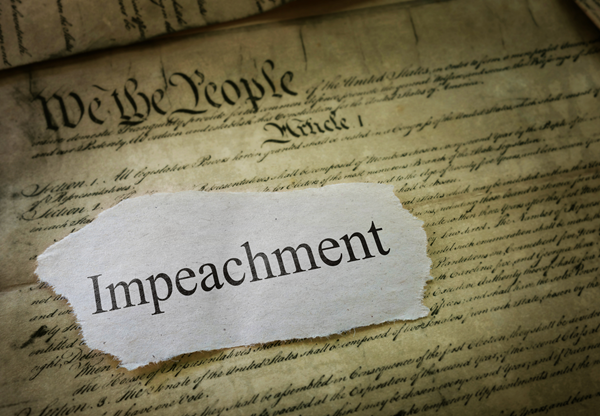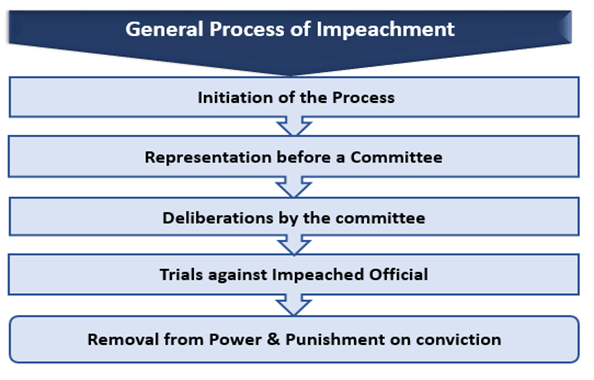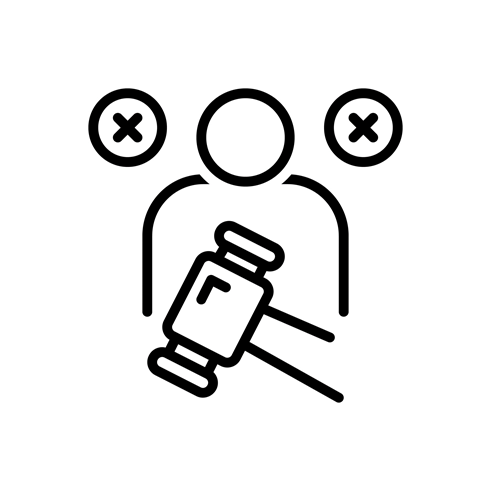Impeachment
What is Impeachment?
Impeachment, in a layman's language, means accusation or a charge on someone. It is a formal process of stating someone guilty of high crimes or misconducts. It is usually a term used against top-level government servants, legislative officers, or ministerial position holders. It is a power given by law to keep a check on or legally punish an individual for violating rules or abusing official rights or powers. Once a person is impeached, they are then sent for trial and, if found guilty, is removed from power. This process is specifically laid out in the US by the constitution, and power has been granted to the House of Representatives to impeach an official.
Summary
- Impeachment is the prescribed process to charge a criminal offence or misconduct on a civil officer holding a prestigious position to eliminate them from power.
- Only a few officials who have been inferred this right by the constitution can impeach another official and convict them.
- Impeachment is a charging process, which only initiates legal proceedings, and it is not the same as declaring someone as a criminal.
Frequently Asked Questions (FAQ)
What are impeachable offences under US Federal Law?

Source: © Zimmytws | Megapixl.com
As per the US Federal law, the definition of impeachable crimes only included corruption, misconduct, or negligence of duty. Later, it was expanded to include betrayal to the nation, accepting or giving bribes, and being a chain link for corrupt activities. If one goes by the actual wording, it is just 'treason, bribery, or other high crimes and misdemeanours.
The expression 'high crimes and misdemeanours are open to interpretation. It has been borrowed from the English laws, which only means crimes by public officials against the government. But in the case of the US, it may include a wide variety of matters that can be considered as an impeachable offence. It is thus a highly debated issue amongst lawyers and judiciary members whenever such cases crop up. Often it is concluded as an offence, which most of the House of Representatives consider being impeachment.
What is the general procedure of impeachment proceedings?
The process of impeachment differs in different countries while the procedure on a broader term remains the same.

Source: Copyright © 2021 Kalkine Media
- First, an accusation against a high-ranking official is acknowledged and brought to the citizen's notice to initiate legal proceedings.
- Next, the accused official is presented before a representative committee of elected members and the judiciary in the US, known as the House of Representatives.
- Impeachment begins when the Committee resolves the need for an investigation into charges against an accused individual. The Committee may endorse impeachment or release.
- The members of this Committee try to form a consensus on the impeachment charge. They deliberate upon the misconduct or abuse accusations.
- Once they form an opinion, they give the go-ahead for legal trials for the impeachment like any other criminal charge. Proofs of the charge are bought out, and in most regions, even the president is part of the proceedings.
- The impeachment court, if separate, consists of a lobby of judges, key government officials and representatives.
- If the law convicts the impeached person, i.e., found guilty, all powers earlier conferred by law are cancelled and taken away from them. Many countries also charge huge penalties or punitive jail to the impeached person. It can also result in a permanent ban from any political or government involvement.
- Once the trial begins, everything becomes public, and citizens can gain knowledge via any form of media they follow.
What are the penalties of impeachment and conviction?

Source: © Priyankachd85 | Megapixl.com
Impeachment, by nature, is just an accusation. It is not affirmative to charge any penalty. Once citizens come to know of impeachment charges on an executive, that individual's reputation is at stake. Impeachment to become a punitive offence requires proof and conviction of criminal charges after a proper trial.
Typically, consequences of Impeachment are-
- The immediate effect of conviction of impeachment is removal from office.
- Official becomes disqualified to hold any office of public trust again.
- Individuals may not remain eligible to serve in an office in the future.
- One may be subjected to criminal prosecutions for underlying factual matters.
- Conviction on impeachment has resulted in fine and imprisonment, and even in execution.
- Only the countries head or the president can pardon an impeachment from criminal prosecution.
What are some famous examples of impeachment?
In US-
Andrew Johnson- (1868) first US president with impeachment charges. He had attempted to remove the secretary of war. The House of Representatives in the US voted Impeachment against him.
Bill Clinton- (1998) was another president of the US who was charged with falsification and impeding justice in investigations of his bond with an intern at the White House. But in his case, most of the Senate denied perjury and obstruction of justice and president Clinton was proved innocent.
Donald Trump- (2019) House of Representatives impeached him for abusing his presidential powers to deal with the Ukrainian government, to investigate former US vice-president Joe Biden. A majority in the Senate acquitted him. Recently in January 2021, he was again charged for inciting a violent mob of his supporters to the US Capitol to interrupt a congress session regarding elections he lost. He was again proved innocent by the senators.
In UK-
King Charles I- (1649) was impeached by the English Parliament for challenging the laws. He was guilty of attempting to raise an Irish army to pacify his enemies in England. Since kings could not be impeached, he was later sentenced to treason and punished with a public beheading.
Warren Hastings- (1795) was impeached by the House of Commons for corruption and mismanagement. He was charged for his actions in India. It was an instance where a retired official was impeached and had to face trials.
 Please wait processing your request...
Please wait processing your request...